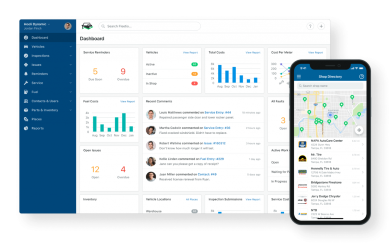
Enhancing Safety: The Power of Fleet Risk Management Software.
In the fast-paced world of fleet management, ensuring the safety of drivers, vehicles, and cargo is paramount. With the rise of advanced technologies and the increasing complexity of logistics operations, organizations are turning to fleet risk management software to optimize safety and mitigate risks. From real-time monitoring to predictive analytics, these innovative solutions offer a comprehensive approach to managing fleet safety and enhancing overall operational efficiency. Let's explore how fleet risk management software can transform safety practices and protect businesses from potential risks.
Real-Time Monitoring and Tracking.
Fleet risk management software provides real-time monitoring and tracking capabilities, allowing organizations to keep a close eye on their vehicles and drivers at all times. With GPS tracking and telematics systems, fleet managers can monitor vehicle location, speed, and route adherence in real-time. This level of visibility enables proactive intervention in the event of emergencies, unauthorized vehicle usage, or deviations from planned routes, helping to prevent accidents and ensure the safety of drivers and cargo.
Driver Behavior Monitoring and Coaching
Another key feature of fleet risk management software is the ability to monitor driver behavior and provide real-time feedback and coaching. By tracking metrics such as speeding, harsh braking, and erratic driving patterns, organizations can identify high-risk drivers and intervene with targeted coaching and training programs. This proactive approach not only improves driver safety but also reduces the likelihood of accidents and costly vehicle damage, ultimately saving lives and protecting company assets.
Risk Assessment and Predictive Analytics
Fleet risk management software utilizes advanced algorithms and predictive analytics to assess potential risks and identify areas of concern before they escalate into serious incidents. By analyzing historical data, traffic patterns, weather conditions, and other relevant factors, these solutions can predict and mitigate risks such as accidents, breakdowns, and delays. This proactive risk management approach allows organizations to implement preventive measures and contingency plans, ensuring the safety and reliability of their fleet operations.
Compliance Management and Regulatory Reporting
Compliance with industry regulations and safety standards is critical for fleet operations, especially in highly regulated industries such as transportation and logistics. Fleet risk management software helps organizations stay compliant with regulatory requirements by providing automated reporting and documentation capabilities. From driver hours of service to vehicle maintenance records, these solutions streamline compliance management and ensure adherence to relevant regulations, reducing the risk of fines, penalties, and legal liabilities.
Emergency Response and Incident Management
In the event of accidents, breakdowns, or other emergencies, fleet risk management software enables quick and effective response and incident management. With integrated communication tools and emergency alert systems, organizations can promptly notify authorities, dispatch assistance, and coordinate response efforts. This rapid response capability minimizes downtime, reduces the severity of incidents, and enhances the safety and well-being of drivers and passengers.
Conclusion
In today's competitive business environment, safety is not just a priority—it's a strategic imperative. Fleet risk management software offers a comprehensive solution for optimizing safety practices, mitigating risks, and protecting businesses from potential liabilities. By leveraging real-time monitoring, driver behavior coaching, predictive analytics, compliance management, and emergency response capabilities, organizations can enhance safety, reduce accidents, and improve operational efficiency. As the importance of safety continues to grow, investing in fleet risk management software is not just a smart business decision—it's essential for safeguarding the well-being of drivers, protecting company assets, and ensuring long-term success in the transportation and logistics industry.
2023
© All rights reserved by
quebeta


